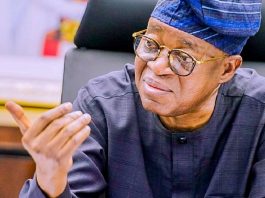IMF Reaches $74.6m Staff-level Agreement with Cameroon
The International Monetary Fund and Cameroon have reached a staff-level agreement that will give the country access to around $74.6 million once the Board formally completes the review, the IMF said in a statement on Monday.
The announcement followed an IMF mission to Cameroon earlier this month and virtual meetings to discuss progress made on reforms and policy priorities in the context of the third review of the program, supported by Extended Credit Facility and Extended Fund Facility arrangements.
“The mission has reached staff-level agreement with the Cameroonian authorities on the economic and financial policies that could support the approval of the third review of the program,” IMF mission chief for Cameroon Cemile Sancak said in the statement.
“Conclusion of the third review by the IMF Executive Board scheduled in early March 2023 would enable the disbursement of SDR 55.2 million (about US$74.6 million),” she added.
The central African country’s economy grew at an estimated 3.4% in 2022, up from 3.6% in 2021. It is projected to reach 4.3% growth this year, the statement said.
Headline inflation is expected to reach 6% at the end of 2022, mainly driven by food prices due to higher import costs and domestic supply pressures.
Ms. Sancak said, “The mission has reached staff-level agreement with the Cameroonian authorities on the economic and financial policies that could support the approval of the third review of the program under the ECF and EFF arrangements. Conclusion of the third review by the IMF Executive Board scheduled in early March 2023 would enable the disbursement of SDR 55.2 million (about US$74.6 million).
“Cameroon proved resilient to the COVID-19 shock. Following an increase of 3.6 percent in 2021, real GDP growth is expected to remain stable at 3.4 percent in 2022. Headline inflation is expected to reach 6 percent at end-2022, mainly driven by food prices due to higher import costs as well as domestic supply pressures.
“However, Cameroon is now facing increased challenges in an uncertain global environment. The recovery is subject to greater risks with spillovers from Russia’s war in Ukraine, including inflationary pressures, supply chain disruptions, and a tightening of global financial conditions. Prolonged shortages and high prices of fertilizers have raised food security challenges.
“The mission welcomed the authorities’ efforts to ensure adequate supplies of fertilizer for the harvest, supported by the World Bank and African Development Bank.
“The overall fiscal deficit is expected to decline to 1.7 percent of GDP in 2022, supported by continued recovery, higher oil prices, and non-oil tax revenue. The performance of non-oil tax revenue should offset the increase in current spending mainly from higher fuel subsidies, which are estimated to reach CFAF 800 billion (2.9 percent of GDP) in 2022. The public debt-to-GDP ratio is estimated at 46.3 percent at end-2022.
“The economic outlook for 2023 is favorable though subject to considerable downside risks, especially from the external economic environment. Economic growth is expected to accelerate to 4.3 percent in 2023 while inflation is projected to remain at about 6 percent at end-2023.
“The authorities expressed their continued commitment to maintaining macroeconomic stability and to further reducing the non-oil primary fiscal deficit to 2.2 percent of GDP to contain public debt at 43 percent of GDP in 2023.
“To make room for productive investment and social spending, the authorities agreed on the need to further mobilize domestic non-oil revenues through widening the tax base. Furthermore, they recognized the need to reduce the costly fuel subsidies, which are unsustainable under the current international oil price projections and are poorly targeted to those in need and crowd out priority spending.
“For example, the fuel subsidies represent six times the budget allocated to agriculture, four times that to health, and over three times that to energy and water. Fuel subsidy reform would need to be accompanied by measures to mitigate the impact on the most vulnerable, including cash transfers.
“The medium-term prospects remain favourable provided reforms continue. The authorities’ strategy remains focused on unlocking Cameroon’s growth potential by creating fiscal space for priority spending, especially for infrastructure that would support the growth needed to meet the SND30 objectives while maintaining debt management.
“To this end, the pace of structural reforms needs to be sharply accelerated, including a concerted effort to improve the business climate for private sector to underpin inclusive and resilient growth. A review of tax policy to mobilize domestic non-oil revenues and broaden the tax base remains a high priority.
“The mission noted the progress, albeit slow, in strengthening public financial management, and further efforts are needed to ensure disciplined budget execution and to complete major infrastructure projects, especially in the transport and energy sectors. It also noted the need for continued progress in the financial management of public enterprises and the rehabilitation of SONARA.
“The mission welcomed the important steps to strengthen transparency and governance, especially the Supreme Court’s Audit Bench.
“The mission noted the authorities’ commitment to implementing policies consistent with the stability of the CEMAC region’s monetary arrangement, which includes rebuilding foreign reserves at the Bank of Central African States (BEAC). To this end, the authorities are working to strengthen compliance with the foreign exchange regulations notably regarding the repatriation of export earnings, while not impeding legitimate payments overseas.”
“The IMF team met with the Prime Minister, Joseph Dion Ngute, the Minister of State and Secretary General of the Presidency, Ferdinand Ngoh Ngoh, the Minister of Finance, Louis Paul Motaze, the Minister of the Economy, Planning, and Regional Development, Alamine Ousmane Mey, the National Director of the BEAC, Emmanuel Nkoa Ayissi, and other senior officials. The mission also met with representatives of development partners, the diplomatic community, the private sector, civil society, and unions.
“The team wishes to thank the Cameroonian authorities for their excellent cooperation and for the frank and constructive dialogue.” # IMF Reaches $74.6m Staff-level Agreement with Cameroon >>>Naira Depreciates to N462 at Investors, Exporters FX Window




